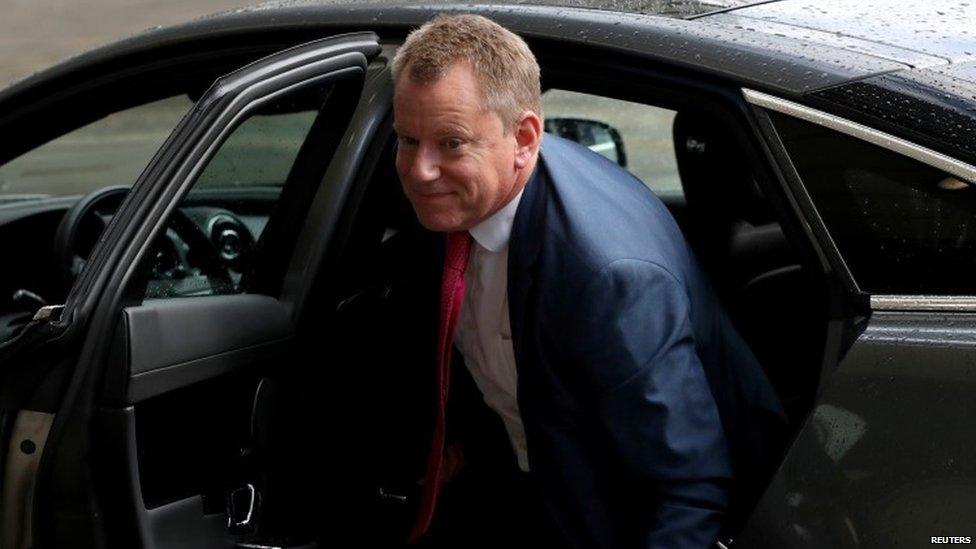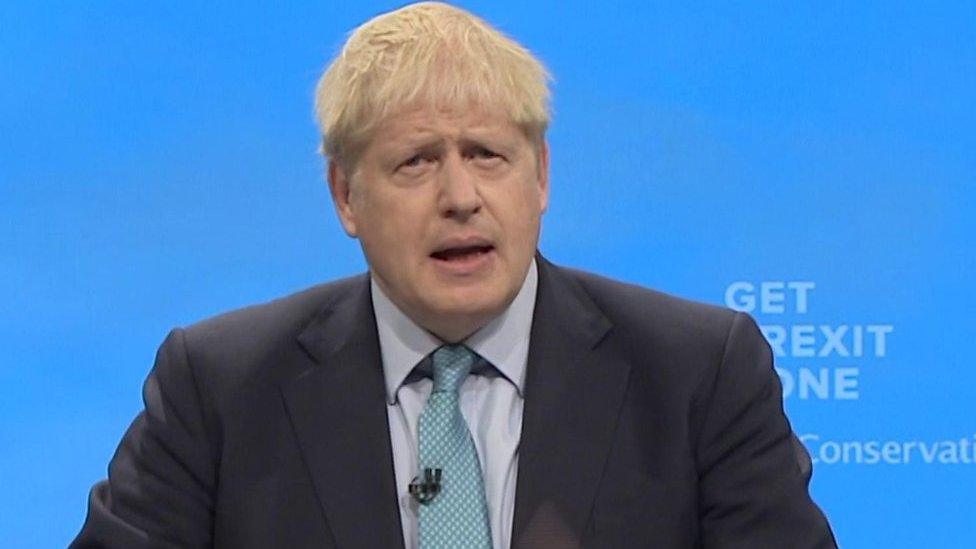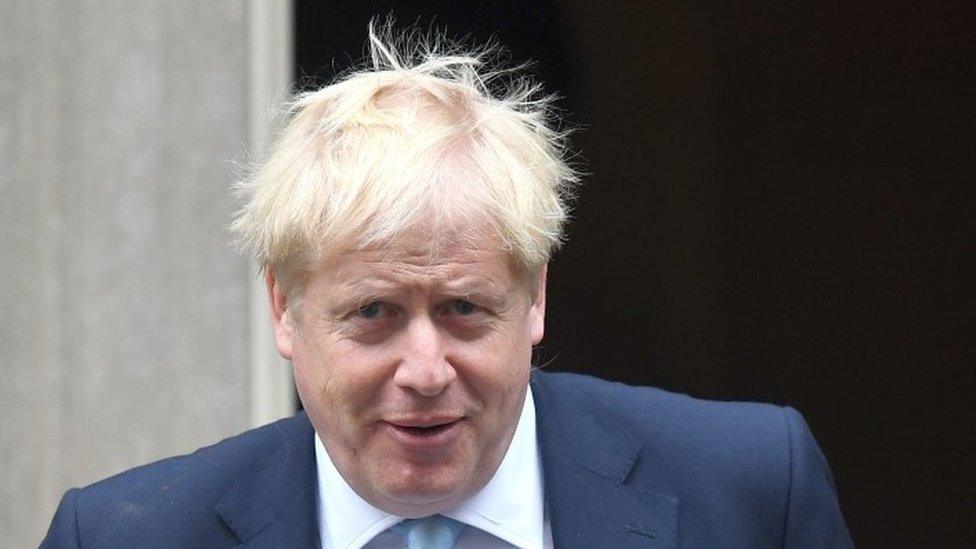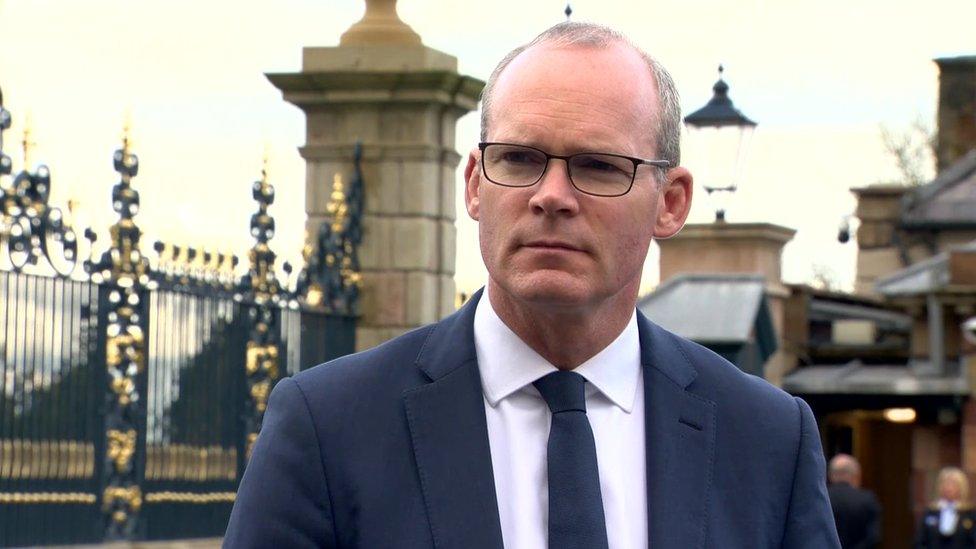Brexit: UK may 'clarify' new offer after EU urged 'fundamental changes'
- Published

The UK's Brexit envoy David Frost will be back in Brussels on Monday
The UK has indicated it could "clarify" its new Brexit offer after the EU called for "fundamental changes".
Talks will resume on Monday after the EU said the UK's proposed alternative to the Irish backstop could not be the "basis" for a legally-binding treaty.
The UK has said it would work on the details before then but there was "no path" to a deal without alternative arrangements in Northern Ireland.
Boris Johnson has insisted the only options are a "new deal or no deal".
Earlier on Friday, he posted a message on social media saying there would be "no delay" to the UK's exit beyond the 31 October deadline.
This was despite the government stating, in papers submitted to a Scottish court, that the PM would comply with legislation passed by Parliament, known as the Benn Act.
This requires him to send a letter to the EU asking for a further three-month Brexit extension if no deal is agreed by 19 October - a day after a crucial summit of European leaders.
The UK has said its new proposals, presented on Wednesday, represent a "significant" shift and the basis for a "fair and reasonable compromise" after months of deadlock.
The BBC's Adam Fleming said, after five hours of talks on Friday, the two sides have not agreed to enter the so-called "tunnel" of intense negotiations on a final legal text.
He said the UK wanted that process to be under way by now but the EU is worried that the UK wants to leave too many details about customs and regulatory checks in Northern Ireland to be agreed during the post-Brexit transition period.
Last week in Brexit: The PM revealed his plan to attempt to "get Brexit done"
The EU's negotiators told diplomats on Friday that questions and gaps still remained and that fundamental changes were needed to make the UK blueprint acceptable.
The UK subsequently informed the European Commission it would do further work over the weekend and possibly submit clarifications by Monday - while stressing that the EU also needed to "move at pace" and the backstop must be replaced.
'Close to zero'
Brexit Party leader Nigel Farage told the BBC that Mr Johnson was "deluding" himself if he thought he could do a deal, saying the odds were "hovering close to zero".
He told Radio 4's Any Questions that Brexiteers' trust in the prime minister would "evaporate" if he failed to keep his promises to meet the 31 October deadline.
Confused by Brexit jargon? Reality Check unpacks the basics.
Labour's Barry Gardiner told the same programme the PM seemed to be "lying to himself" over the Brexit deadline and he had a "tangential grasp" of the truth.
But Justice Secretary Robert Buckland said people needed to "move away from that kind of language" and the PM was "sincere" in his intentions.
While there were "hard yards" ahead in the talks, he said 19 October was an "eon away" and Mr Johnson was focused on bridging the gap between the two sides.
Anti-Brexit campaigners say Mr Johnson cannot be trusted, given the apparent contradiction between his repeated insistence on a 31 October Brexit and documents seen by Edinburgh's Court of Session suggesting he will request a delay if the conditions of the Benn Act are met.
The document emerged during a legal action initiated by QC Jo Maugham and SNP MP Joanna Cherry - who are seeking a legal ruling forcing the PM to comply with the law.
'True position'
No 10 has insisted that the government will obey the law in respect of the Benn Act, which is named after Labour MP Hilary Benn who spearheaded its passage into law.
But a senior Downing Street source told the BBC the law "can be interpreted in different ways" and the government was not prevented from "doing other things" that might forestall a further delay - which would have to be approved by all other 27 EU countries.
"The government is making its true position on delay known privately in Europe and this will become public soon," the source said.
Hungary's foreign minister Peter Szijjarto told the BBC there had been "rumours" his country may have been asked to veto another extension "but no such request has been received".
It came after a video posted to social media appeared to show Mr Szijjarto and Hungary's ambassador to Britain leaving the Cabinet Office building in Whitehall earlier this week.
Meanwhile, Tory MP Daniel Kawczynski has said he is considering mounting a private legal challenge to the Benn Act, which has been labelled the Surrender Act by its critics.
Allow X content?
This article contains content provided by X. We ask for your permission before anything is loaded, as they may be using cookies and other technologies. You may want to read X’s cookie policy, external and privacy policy, external before accepting. To view this content choose ‘accept and continue’.
- Published5 October 2019

- Published4 October 2019

- Published4 October 2019

- Published13 December 2020
